Fixing A Broken Heart
Dr. Guy Winch, How To Fix A Broken Heart
 Even the most grounded person can be devastated by the loss of a pet. Dr. Guy Winch is an authority on broken-hearts and has answers to common questions following the death of a pet. He says you should avoid the 5 common mistakes when grieving the loss of a pet, including not getting rid of reminders like feeding bowls and leashes and feeling guilty about getting another pet.
Even the most grounded person can be devastated by the loss of a pet. Dr. Guy Winch is an authority on broken-hearts and has answers to common questions following the death of a pet. He says you should avoid the 5 common mistakes when grieving the loss of a pet, including not getting rid of reminders like feeding bowls and leashes and feeling guilty about getting another pet.
At Animal Radio, we celebrate the connection with our pets who give us unconditional love. We sometimes even love our pets more than the human people in our lives. However, one of the most depressing things about having an animal is that they have such short lives. You know if you have an animal, you're ultimately going to have to deal with the grief of losing them.
No matter how many times you lose an animal, it just doesn't seem to get any easier. It can even leave you with a broken heart. You might have heard about a woman in Texas who suffered "Broken Heart Syndrome." She had classic symptoms of a heart attack after the death of her little Yorkshire Terrier.
Dr. Guy Winch has written a book called, "How to Fix a Broken Heart," which not only includes romantic loss, but the loss of a pet as well. Being a psychologist and having a private practice for many years, as well as being versed in the research, he is an expert on broken hearts.
One thing that Dr. Winch has noticed in his practice is that when people lose their pet, hearts do get broken. Unfortunately, while their hearts get broken, it's one of those things that the people around them take much less seriously than they should. It's one of those forms of grief that is unsanctioned in our society. No one ever goes to work and tells their boss they need time off because their cat died. And yet the grief we can experience can be as severe as when you lose a close relative.
Many off us don't tell anyone what we are experiencing when we lose a pet, because we are afraid that they would scoff at it. According to Dr. Winch, this complicates the grief.
In other words, Dr. Winch explains that the science is very clear that we experience the grief of losing a pet very profoundly. There are all kinds of psychological reasons we do experience that grief profoundly because animals have incredible functions in our lives. Yet, it's such a shame that the emotional and social support, which have shown to be very important factors in our recovery, are often denied us and we even feel silly about asking for them.
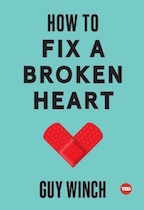 Owners make five common mistakes when grieving the loss of a pet, according to Dr. Winch. One example is the reminders. If your dog dies, should you leave out the bowls and the grooming tools and the mat they used to sleep on? Should you keep all those things around or should you put all of them away? Dr. Winch states it's a very individualized situation. What you need to do is monitor the recovery of your grief. So if you've kept everything out and you find that you're not moving forward, you're not recovering, the pain isn't lessening and thinking about your pet is not lessening, then you should probably put those items away. However, if you put them away too suddenly and you're trying to shove it out of your mind but you can't stop thinking about it anyway, then you need to process it and you need to talk about it. Grief is a very individualized thing.
Owners make five common mistakes when grieving the loss of a pet, according to Dr. Winch. One example is the reminders. If your dog dies, should you leave out the bowls and the grooming tools and the mat they used to sleep on? Should you keep all those things around or should you put all of them away? Dr. Winch states it's a very individualized situation. What you need to do is monitor the recovery of your grief. So if you've kept everything out and you find that you're not moving forward, you're not recovering, the pain isn't lessening and thinking about your pet is not lessening, then you should probably put those items away. However, if you put them away too suddenly and you're trying to shove it out of your mind but you can't stop thinking about it anyway, then you need to process it and you need to talk about it. Grief is a very individualized thing.
Dr. Winch explains that one of the most important things is that our pets connect us to all kinds of social activities, to all kinds of groups, to all kinds of other people. These could be the people we meet in the dog park or your neighbors. You know how it goes, no one knows your name, but you are known as the mother or father of your animal, which everyone probably knows by name.
When your pet dies, you lose all of that. Suddenly you could be walking around your neighborhood alone and rather than being stopped every block, you're invisible and anonymous. You lose parts of your identity. One of the main tips is you have to very much identify the voids that the loss created in your mind and find ways to fill them.
Should you go out and get another dog right away? Dr. Winch states it depends on whatever works for you. Typically, getting another pet can actually be helpful. But it depends how quickly you do it. In other words if you're getting another pet the day your pet dies, then in a way you're trying not to deal with that grief and that can actually fester a little bit. However, if you mourn the animal for a bit and then you decide you know you loved that animal so much you're going to get another one, then that should be fine.
If you do get another pet, should you get one identical to the one you lost? Should you give it the same name as well? We name our children the 2nd, 3rd, etc., which is very common, but Dr. Winch thinks that if you are trying to do it so you don't have to deal with the loss of your pet, that might be problematic. However, if you're doing it after having dealt with the loss, then that can actually be very useful.
Cloning is now possible on our companion animals, which makes it possible to get an identical animal with the same DNA. Dr. Winch feels that's a little bit silly, because if you get another dog, for example, of the same breed, it is likely to have very similar personalities. Dr. Winch tells us that he is an identical twin, so he can tell us from original cloning that you can have the same DNA and still turn out different in all kinds of different ways. So you're actually much better served getting another animal that already exists rather than spending all that money trying to replicate an animal when you can already get 95-percent similarity if you go with the same breed.
Some people feel that they can't go through the pain of losing a pet ever again, so they decide never to own another one, or they feel guilty and feel if they get another pet they are replacing the one they lost. Dr. Winch explains that guilt is a big problem when it comes to our pets because pets can't speak to us and let us know if something's hurting or bothering them. A lot of the times we don't know they're feeling really badly, or we don't know they're about to die, and maybe we left the house to go to work because they couldn't tell us that they were barely holding on, then we come home from work and it is too late.
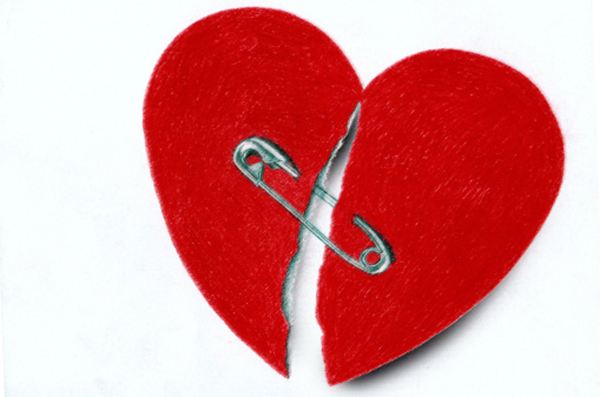 We tend to feel very guilty and part of what Dr. Winch talks about in his book is that we have to recognize that the loyalty that we experienced from that pet really went two ways. One thing is we tend to be extremely loyal to our pets and we tend to favor them sometimes over the human people in our lives. Dr. Winch doesn't think that that's a bad thing, because pets can sometimes do a better job for us than the people in our lives can. But we have to recognize all we've done and the quality of life that we have given to a pet and realize that we've really given them as great a life as we could give them. Guilt, in a way, is sometimes easier to feel than grief but it's really about grief, it's not about guilt.
We tend to feel very guilty and part of what Dr. Winch talks about in his book is that we have to recognize that the loyalty that we experienced from that pet really went two ways. One thing is we tend to be extremely loyal to our pets and we tend to favor them sometimes over the human people in our lives. Dr. Winch doesn't think that that's a bad thing, because pets can sometimes do a better job for us than the people in our lives can. But we have to recognize all we've done and the quality of life that we have given to a pet and realize that we've really given them as great a life as we could give them. Guilt, in a way, is sometimes easier to feel than grief but it's really about grief, it's not about guilt.
Should you hold onto items that perhaps even smell like your pet? Dr. Winch explains that when we lose someone very dear to us, whether it's an animal or a person, a year later when we think about them, it's going to evoke an ache and sadness. At that time, we should be at the point where we are thinking about them in an unconscious way rather than thoughts about them constantly invading us in an unwanted way. So if a year later you are still preoccupied, if you are still walking around thinking about it on a regular or a daily basis, then it might not be a good idea to hold on to the item, because you might not have fully processed the grief. But if you have, and this is just one of those reminders that when you look at it and when you when you smell it and it kind of gives you a moment of nostalgia and then you can move on and enjoy your evening, that would be okay. However, if it sends you to a place where you are then depressed and don't want to speak to anyone, then the answer is no - get rid of it.
Find out more what happens to our brains and our body when out heart gets broken and how our reaction to heartbreak is as much because of society as it is science in Dr. Winch's book, "How to Fix a Broken Heart."
Visit Website
Pit Bulls Being Used To Fight Crime
Brad Croft, Universal K9
 Brad Croft of Universal K9 trains shelter Pit Bulls to assist police officers in fighting crime and searching for people. The success of the program can be seen around the country as more police departments express interest in these dogs.
Brad Croft of Universal K9 trains shelter Pit Bulls to assist police officers in fighting crime and searching for people. The success of the program can be seen around the country as more police departments express interest in these dogs.
Police departments work very hard to ensure the safety of the communities, which they serve. A number of police departments across the country have added rescue and shelter dogs to their police force as inexpensive and highly effective resources to help combat crime. Through the Animal Farm Foundation's (AFF) Detection Dog Program and Universal K9, shelter dogs are trained to become Detection Dogs to assist police officers in fighting crime.
Universal K9, located in San Antonio, Texas, rescues dogs and trains them for various law enforcement activities. They then donate these dogs to police departments all around the United States.
Brad explains that there are still for profit companies that train and sell purebred dogs for to police departments. However, his company tries to show the police and sheriff departments that you don't need to spend a great amount of money on those dogs. He says there are plenty of capable dogs in shelters all around the United States that could be used for this purpose. Shelter dogs' lives could be saved and in return, they can save many people.
It turns out Pit Bulls excel at this kind of work. He tells us that these dogs are fantastic at finding narcotics. They excel at this type of work and tracking as well. They're very good at tracking adults and missing children. These Pit Bulls are coming from shelters all around the United States and some as far away as Hawaii.
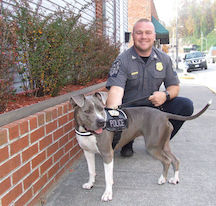 Brad thinks that as time goes by and they keep putting more and more of these dogs to work, police departments are going to start to get it. He hopes to have hundreds, if not thousands, of these dogs working out there.
Brad thinks that as time goes by and they keep putting more and more of these dogs to work, police departments are going to start to get it. He hopes to have hundreds, if not thousands, of these dogs working out there.
Universal K9 has a very high success rate in training these dogs. He claims that it's extremely rare for a dog to fail his program. However, they work closely with shelters and if a dog from a shelter should fail, that shelter will take them back and find them a good home. But for the most part, all the dogs that he sources make it through the program.
This is because they look for certain dogs at the shelters. They want dogs that have a high drive. A dog with a high drive is normally passed over at adoption events, because they're jumping up and down, they're barking consistently or they just have way too much energy for a family. Unfortunately, these dogs usually get put down because they're not adoptable. However, those dogs are the dogs that work really well for police training.
Brad didn't always train dogs for a living. He used to own a swimming pool company and was on the road a lot, which left his wife at home alone with their daughter. At one point in time, someone started breaking in cars in his neighborhood and his wife didn't feel safe. Brad told his wife to get a gun, but she wasn't comfortable with that idea. He then decided to get a trained dog to protect his family when he was gone. He ended up getting a dog from a company that does some of the same stuff that he does now. Brad says he fell in love with the whole idea of "Dogs with a purpose." He ended up hanging around and learning the craft and decided that that was something he wanted to do.
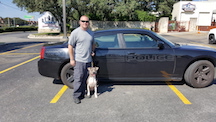 Brad says he started off as a for profit company, but soon realized that there were all of these dogs in shelters that were completely capable of doing the same things and he didn't need to buy expensive dogs from overseas. Plus, there were all of these smaller police departments that needed these dogs but couldn't afford them. Brad started rescuing a few dogs, trained them and then donated them to police departments who couldn't afford them.
Brad says he started off as a for profit company, but soon realized that there were all of these dogs in shelters that were completely capable of doing the same things and he didn't need to buy expensive dogs from overseas. Plus, there were all of these smaller police departments that needed these dogs but couldn't afford them. Brad started rescuing a few dogs, trained them and then donated them to police departments who couldn't afford them.
Once the word got out how good Brad's dogs were, it just took off like wildfire, and he decided to convert to a non-profit company so he could help more police departments.
About Universal K9: Universal K9 solely exists to save dogs to train for law enforcement and veterans. Visit Website
About Animal Farm Foundation: Animal Farm Foundation (AFF) is a 501(c)3 whose mission is to secure equal treatment and opportunity for "Pit Bull" dogs through recognizing that all dogs are individuals. Established in the 1980s, AFF works to achieve this goal by offering free resources to animal care workers and community advocates, as well as through their assistance dog, detection dog, and grant programs. Visit Website
Will Your Dog's Chew Bone Injure Her Teeth? - Dr. Debbie
 Even veterinarians can make bad choices when it comes to their pet's health. I learned this when I discovered my dog, Nikki, had a broken tooth. The cause was a chew item I thought was a safe option for her to gnaw on. But I was wrong - no chew item is risk free. Sadly my Nikki had to crack three teeth for me to learn that lesson.
Even veterinarians can make bad choices when it comes to their pet's health. I learned this when I discovered my dog, Nikki, had a broken tooth. The cause was a chew item I thought was a safe option for her to gnaw on. But I was wrong - no chew item is risk free. Sadly my Nikki had to crack three teeth for me to learn that lesson.
Oh yes, it was three broken teeth! But more on that later...
Considering Chew Options
What chew options are there? As the owner of a large powerful chewer I considered the possibilities for my dog. She has a sensitive stomach and cannot tolerate edible bones or preserved rawhide products. Thank goodness, because feeding my dog pig snouts or pizzles just makes me want to gag. I'm not a fan of real bones - too many patients with broken teeth, gastrointestinal blockages and even one with a bone shard migrating through the side of a dog's throat. Soft plastic toys don't survive the first two minutes with her, and plush toys quickly lose eyes, limbs and squeakers with her near surgical precision. So I chose to offer synthetic Nylabone style bones to deal with her chewing drive. Nikki loves the flavors and happily chews away for long periods of time. When the bone looks damaged, I throw it away. It seemed like the perfect solution for a vigorous chewer.
Discovering Her Broken Tooth
While brushing Nikki's teeth, I noted a fracture of her upper fourth premolar tooth. This is the largest cheek tooth on a dog or cat's upper jaw, which serves to chew and grind food. The outer layer of the tooth was sheared off, just like a shelf of ice cracking off an iceberg. This type of fracture is common from dogs chewing on an object harder than tooth enamel. Common culprits for this type of tooth damage include antler chews, Nylabones, real bones or ice.
What to Do With Broken Teeth?
Not all tooth fractures are created equal. An uncomplicated tooth fracture is one in which only the enamel is broken. The tooth is vulnerable to further injury but is not immediately causing the pet pain. A complicated fracture is one in which the break extends beyond the enamel into the pulp chamber.
The pulp of a tooth is the inner layer where the nerve and blood supply runs. Exposure of the pulp not only causes pain, but serves as direct pathway for oral bacteria to cause a tooth abscess or spread through the bloodstream.
How to Treat a Tooth Fracture?
A complicated tooth fracture requires either a root canal or surgical extraction. Leaving a complicated tooth fracture untreated is NOT an option. These teeth hurt and shouldn't be ignored. Pets won't whine or cry out in pain with broken teeth, but rather suffer in silence. But after a diseased tooth is addressed, owners commonly note their pet's overall activity and attitude improve.
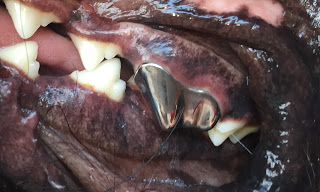 The preferred treatment for a complicated tooth fractures is a root canal. During a root canal the contents of the pulp are removed, filled in, and the tooth is sealed. After the root canal therapy the tooth is still functional for normal chewing activities.
The preferred treatment for a complicated tooth fractures is a root canal. During a root canal the contents of the pulp are removed, filled in, and the tooth is sealed. After the root canal therapy the tooth is still functional for normal chewing activities.
If a root canal cannot be pursued, then the tooth should be surgically extracted. This removes the source of pain and potential infection. However, surgical removal of broken teeth may affect the pet's ability to chew on that side in the future.
Uncomplicated tooth fractures aren't treated as above, but rather may need outward support of the area with bonding restoration.
My Dog's Dentist Visit
Dental cleanings and extractions are a daily service at most veterinary practices, but root canals and tooth restorations aren't commonly available at general practices. I knew I could pull Nikki's tooth, but to save this tooth in my young dog, I'd need to see a veterinary dental specialist.
Nikki and I arrived at Arizona Veterinary Dental Specialists where she was evaluated by Dr. Chris Visor who determined that she had an uncomplicated fracture of her premolar and small uncomplicated breaks on two molars.
Her premolar fracture was limited to the enamel, luckily sparing pulp damage, which means she wasn't in pain. But the damaged tooth would be at risk for further injury, so she was fitted for a restoration with a metallic crown (porcelain isn't durable in pets so it's not commonly used). The two other broken teeth had minor damage, so the rough edges were drilled smooth and the tooth surface bonded.
Lesson Learned
After her crown placement, Nikki can't chew on hard chew bones like before. If she did, it could risk damage to her crown as well as her other teeth. Veterinary dentists warn dog owners to try this test of your dog's chew item - if you whack your knee with your dog's chew item and it hurts you, it'll likely break her teeth.
Now I can only imagine scores of dog owners going to their doctors with knee pain….
Take Away Tips: Can You Detect Your Pet's Broken Tooth? Most broken teeth are detected during a physical exam by your veterinarian, but some observant pet owners may discover clues to their pet's broken tooth.
1. No complaining. Don't expect your pet to cry or whine. People complain loudly when a tooth hurts, but pets just don't verbalize dental pain.
2. Uneven tartar accumulation. Due to tooth pain, the pet chews on one side more, the "good side." Tartar builds up more on the "bad side."
3. Dark spot on tooth. Enamel is evenly white, but darker or grey spots could indicate exposed pulp or dentin at the site of a fracture.
4. Draining wound present below the eye. A broken upper premolar or molar with an infected root can cause a draining wound under the eye.
If you notice any of these signs, get your dog to a veterinarian right away.
Featured veterinarian known as "Dr. Debbie" on national pet radio program, Animal Radio. Ebook author of "Yorkshire Terriers: How to Be Your Dog's Best Friend"; "Pugs: How to Be Your Dog's Best Friend"; "Mini Schnauzers: How to Be Your Dog's Best Friend"; and "Shih Tzu: How to Be Your Dog's Best Friend." Dr. Debbie's books.
Visit Website
5 Ways To A Healthier & Happier Cat
Robert Semrow, Listomania
 Cat owners know that a healthy cat is more likely to be a very happy cat. February is National Cat Health and to that end I thought I would share 5 ways to a healthier and happier cat.
Cat owners know that a healthy cat is more likely to be a very happy cat. February is National Cat Health and to that end I thought I would share 5 ways to a healthier and happier cat.
To begin with, start with nutrition. Your cat's nutrition is so important to its overall existence, it can't be emphasized enough. Cats are naturally predators and carnivores, so an emphasis on nutritional proteins should be at the top of the list. Also, consider providing them smaller, but more frequent meals. Finally, make sure you are giving them proper portions for their meals and remember that you can't exercise your way out of a bad diet.
Next is fresh water. Fresh water is critical for cats to help avoid urinary problems. Cats have an acute sense of smell, so if you see your cat avoiding the water bowl, consider that it may smell of detergents or maybe of chemicals from tap water if you are not giving purified water. Also, what kind of bowl are you using and maybe consider offering multiple bowls. Also, consider the placement of the bowls and how often they come to drink from that area.
Grooming is another way to help keep your cat healthier. Cats are often proud self-groomers, but you should be assisting by brushing them as often as they will allow, daily if possible. If you can get in to that routine, your cat will look at it as part of your daily bonding time and benefit from a reduction in excess hair and probably less hairballs as well. Additionally, it's important to have that ability to observe and be in contact with your cat's entire body so that you can notice any changes that may have occurred. This will help reduce fear of being touched by strangers.
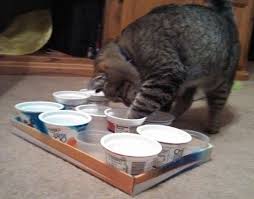 One of my more favorite ways to a healthy cat is engaging the Natural Cat. What I mean by that is engaging them to indulge their natural instincts of hunting and giving them a reason to get up and get active physically and mentally. Utilize their treats in a predator manner by placing them in different areas of the home, giving them a sense and satisfaction of hunting. Toys, challenges, climbing areas and more give them a chance to engage their natural instincts, while keeping them satisfied in their non-natural indoor existence. It's fine to let them sleep, but that must be followed up with some bursts of activity to keep them healthy overall.
One of my more favorite ways to a healthy cat is engaging the Natural Cat. What I mean by that is engaging them to indulge their natural instincts of hunting and giving them a reason to get up and get active physically and mentally. Utilize their treats in a predator manner by placing them in different areas of the home, giving them a sense and satisfaction of hunting. Toys, challenges, climbing areas and more give them a chance to engage their natural instincts, while keeping them satisfied in their non-natural indoor existence. It's fine to let them sleep, but that must be followed up with some bursts of activity to keep them healthy overall.
Finally, create stress free places for them. Give them places to remove themselves to when they are nervous. Give them different levels of the home to observe and feel safety from. When you are engaging them be cognizant of their reactions, are they playful or agitated? Keep your energy around them consistent and predictable.
Cats are majestic beings who deserve the best that their owners can give them, but in a healthy way that promotes healthy outcomes.
Share your ways to a healthier cat on our Animal Radio Facebook Page.
Visit Website
strong>Animal Radio News - Lori Brooks
 Can Dogs Really Smell Fear?
Can Dogs Really Smell Fear?
If you've ever been nervous around a dog and was told to just be calm because dogs can "smell fear," well, that is good advice, though most people can't suddenly calm their fear. Believe it or not, the sentiment behind that guidance is rooted in some truth. While dogs probably can't literally smell fear, they do seem to respond to fearful people with more aggression, according to a study in the British Medical Journal. This research did find that anxious, neurotic people are more likely to be bitten by dogs. Further, the researchers found that most victims were bitten by dogs they didn't know. Men were almost twice as likely to report a bite than women and dog owners were over three times more likely. But the slim majority of bites, just below 55-percent, happened to people who had never met the dog before the encounter. Another pattern they found was that people who were less emotionally stable and more anxious were also more likely to get bitten. For each drop in a one-to-seven scale measuring neuroticism (seven being the most stable), the associated risk of a lifetime bite rose by 33-percent. The study is a first of its kind, since it did not rely on hospital records, but rather self-reporting. More studies will be done to confirm the anxiety and dog bites connection. Now, if anxiety and other risk factors, like being male, do turn out to be a trigger for dog bites, then that could lead to educational initiatives more tailored to specific risk groups, like men, children, and those less emotionally stable.
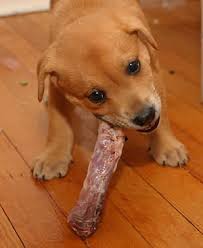 Giving Your Dogs Chicken Necks Can Cause Paralysis
Giving Your Dogs Chicken Necks Can Cause Paralysis
Wanting the best for our pets, we often give them special treats, which include chicken necks that are especially favored by smaller dogs and are normally considered a 'healthy' treat. But, that thinking needs to change after a study at the University of Melbourne in Australia. Veterinarians are now warning that raw chicken, particularly chicken necks, can lead to a debilitating and possibly fatal form of paralysis in dogs called Acute Polyradiculoneuritis, or APN for short. The study shows that raw chicken, and especially chicken necks, increases a dog's chance of contracting APN by more than 70 times. When a dog gets APN, it's usually first noticed that the dog's hind legs become weak. It can then progress to affect the front legs, neck, head and face. It is fatal if it paralyzes muscles in the chest cavity, like the heart. Most dogs eventually recover without treatment, but it may take up to six months or more in some cases. APN is very similar to the human disease Guillain-Barre Syndrome. This new research showed that dogs with APN were 9.4 times more likely to have had a Campylobacter infection caused by eating raw chicken within the past week. More studies will be done. In humans, scientists think Campylobacter, which is most commonly found in commercial poultry products, contains molecules similar in structure to parts of nerve cells. This confuses the immune system, which then attacks the body's own nerves, resulting in paralysis.
Emotional Support Peacock Not Allowed on Plane
The stories of unruly flights caused by animals continue to grab headlines around the world, like the one where a woman attempted to bring her pet peacock onto a flight out of New Jersey's Newark airport. The woman was told the big bird would not be allowed on the plane even though the owner had bought a separate ticket for the peacock. United Airlines issued a statement saying the peacock did not meet guidelines for a number of reasons, including its weight and size and that they had even explained that to the peacock's owner on three separate occasions before she arrived at the airport.
 Woman Adopts Dog Father Gave Away 8 Years Earlier
Woman Adopts Dog Father Gave Away 8 Years Earlier
A Pittsburgh, Pennsylvania, woman never imagined she'd see her beloved dog from childhood again. But in a twist of fate, the dog was back with her after a long and sad journey. Nicole Grimes was only ten when she got Chloe, a Pomeranian Poodle mix, as a puppy from her grandmother. But, four years later Nicole's dad got a job where he had to work from home and he thought Chloe's barking disrupted his work, so the family took little Chloe to the local shelter. Then, 8 years later, Chloe the dog is 12 years old and appeared on the Facebook page of a friend as needing a home. Nicole thought the dog in the photo looked very familiar. She went to the shelter right away to see if it was Chloe. Luckily Chloe had a microchip, which proved her identity. Nicole believes it is an angelic gift from her grandmother who passed away.
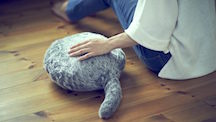 Headless Pet Robot
Headless Pet Robot
Pets heal your soul and your body and you've probably heard most of the research that proves it. However, the responsibility of caring for a creature other than yourself isn't a fit for everyone. Sometimes allergies, mobility, apartment rules and a number of other factors stand in the way of bringing a four-legged furry friend into your life. Qoobo has changed that. The company created a headless pet robot (basically a pillow with a tail) that they call a "therapeutic robot in the form of a cushion." Like a loving pet, the pillow responds to your touch, wagging its single appendage when you scratch or pet it. The company claims giving love to the pillow will pay off healthily by lowering your stress levels.
 Listen to the entire Podcast of this show (#1106)
Listen to the entire Podcast of this show (#1106)





